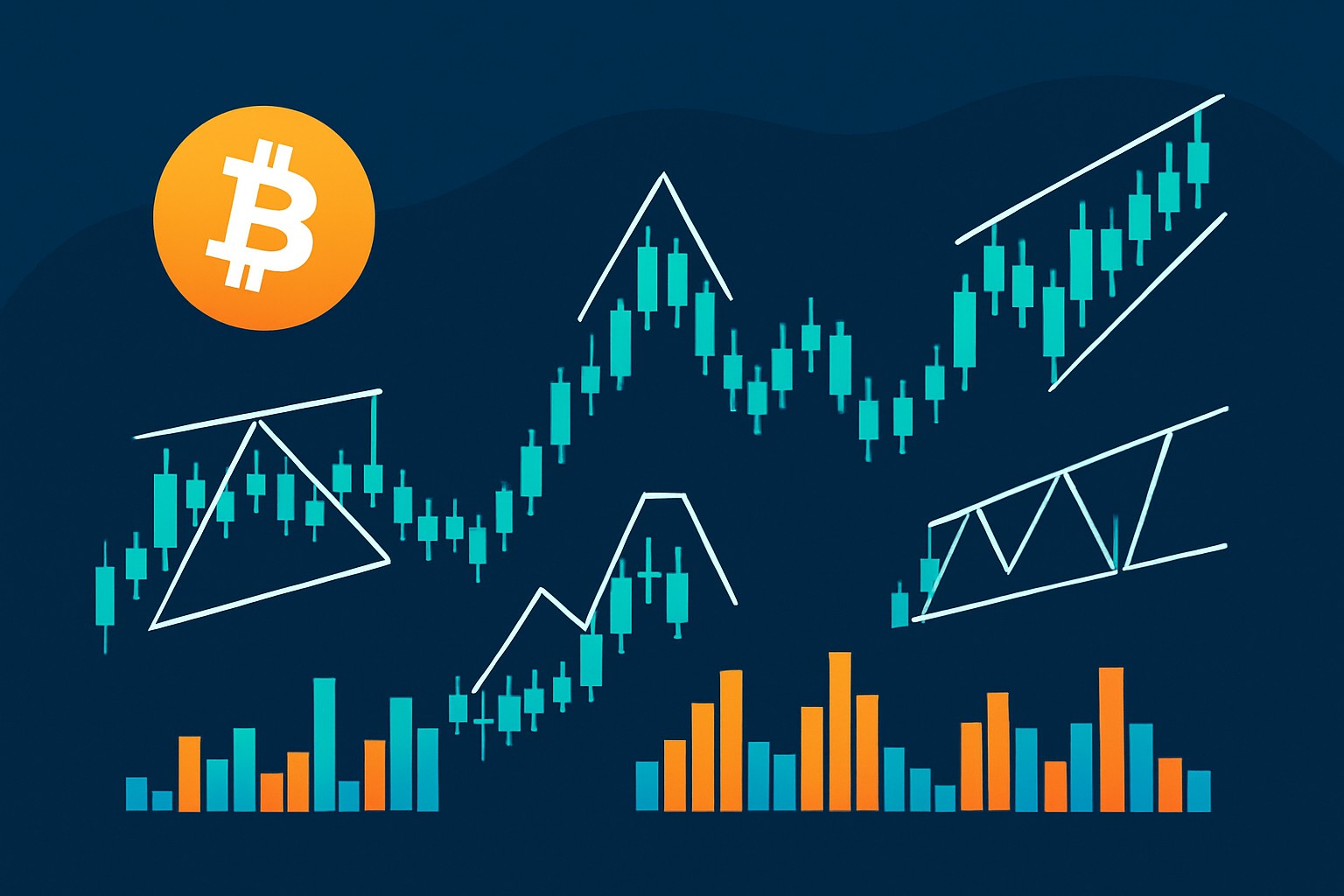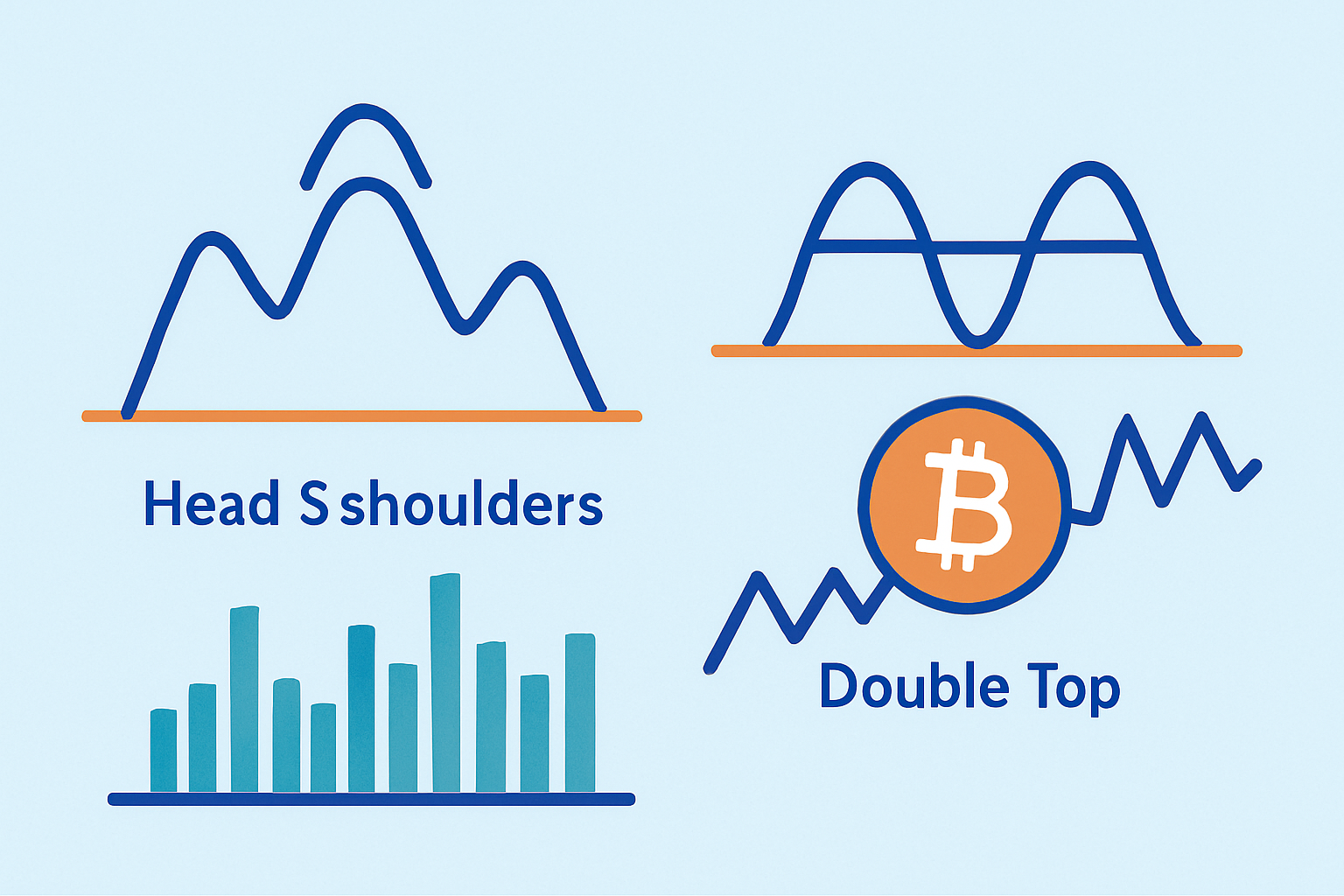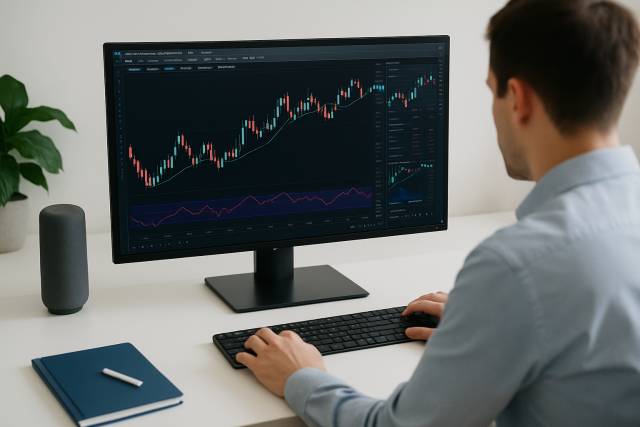Bitcoin Price Patterns That Signal Market Shifts

The bitcoin price is famously volatile, tossing up both exciting opportunities and nerve-wracking risks for investors and traders alike. Those sudden swings often reflect broader shifts in market sentiment and external events.
This article dives into some of the key bitcoin price patterns that tend to signal shifts in market trends.
Diving Into How Bitcoin Prices Jiggle Around and What Fuels Market Feelings
Bitcoin prices often dance to the tune of a blend of market mood swings and trader habits as well as wider economic currents. Technical analysis teams up with behavioral finance to dig into how these forces tug and pull on buying and selling decisions.
It is key to distinguish meaningful price patterns from the usual short-term noise or fleeting trends that come and go. Some fluctuations feel like random blips but if you take a closer look many actually carry predictive hints that can signal upcoming shifts in the trend.
Important Bitcoin Price Patterns That Often Give You a Heads-Up on Market Shifts
Traders and analysts often keep an eye out for those classic bitcoin price patterns to get a feel for when trends might be about to take a turn. Catching these patterns early can give them a much-needed edge in deciding when to jump in or bow out.
Head and Shoulders and Inverse Head and Shoulders Patterns
When it comes to chart patterns, the head and shoulders formation really stands out as a classic—kind of like the little black dress of technical analysis. You’ve got your left shoulder, the head that’s a bit taller (because why not go big or go home), and then the right shoulder. It’s a pattern traders keep an eye on because it often signals a trend reversal, which can be a real game changer if you catch it early.
Flip things upside down and you have the inverse head and shoulders pattern, which is basically the optimistic sibling looking to signal a bullish turnaround. This one’s all about spotting a downtrend that might just be ready to take a bow and exit stage left. Both patterns tell a story, and learning to read the subtle cues can feel like unlocking a secret handshake among traders.
The Head and Shoulders pattern features three peaks, with the middle one boldly standing taller than the two flanking it those are the shoulders by the way. This pattern often rings a bell for a bearish reversal looming on the horizon.
Getting to Grips with Double Top and Double Bottom Patterns
Double top and double bottom patterns often hint that bitcoin's price momentum might be running on fumes. A double top occurs when the price hits a high point twice then takes a nosedive which suggests sellers are starting to flex their muscles. Conversely double bottoms usually point to a potential bullish comeback after the price bumps up against a support level two times.
Understanding Bullish and Bearish Flag Patterns with Market Jargon
Flags highlight brief consolidation periods tucked inside a strong trend, forming small rectangular shapes that lean against the main direction. Bullish flags usually hint at a quick breather before the upward momentum resumes, while bearish flags often suggest the downtrend isn’t done just yet.
Getting to Grips with the Cup and Handle Pattern
The cup and handle pattern is a classic bullish continuation setup, showcasing a gently rounded 'cup' followed by a smaller 'handle' that signals a brief pause or consolidation. This pattern often hints at growing momentum, as bitcoin prices quietly gather steam before making a move.
How Volume and Momentum Indicators Play Along with Price Patterns
Taking a good look at volume alongside price patterns helps confirm how trustworthy those signals are. When volume spikes during breakouts or momentum indicators don’t match price trends, you can usually count on it being a stronger hint that the market is genuinely shifting.
- Sudden spikes in volume often show up just before significant price moves and help separate the real breakouts from false alarms—kind of like a smoke signal you don’t want to ignore.
- The Relative Strength Index (RSI) highlights when an asset feels too hot or cold and usually syncs up with pattern signals to keep you on your toes.
- Moving Average Convergence Divergence (MACD) crossovers are great sidekicks for pattern-based entries. They confirm the momentum shifts that traders live for.
- On-Balance Volume (OBV) trends track the tug-of-war between buyers and sellers over time and give subtle clues about who’s winning the battle.
- Trendline support and resistance levels act as straightforward visual cues that complement patterns and help you make smarter, more confident calls.
Recent Examples Where Bitcoin Price Patterns Reveal Telltale Signs of Market Shifts
Recent events have shown that bitcoin price patterns can pack quite a punch when forecasting major market moves. Take the recovery after the 2022 bear market for instance. An old-school inverse head and shoulders pattern popped up signaling a bullish turnaround that got many traders nodding in agreement. Toward the end of 2023 a double top formation made its debut just as monetary conditions tightened. It warned of a sharp pullback and reminded us why these patterns deserve serious attention.

A key bullish breakout in early 2023 was sparked by a textbook cup and handle pattern paired with rising volume and encouraging momentum in the RSI. This combo set the stage for a strong upward move that many traders could not help but notice. Fast forward to November 2023 and the mood shifted: a double top pattern popped up, volume tapered off, and a bearish MACD crossover showed on the charts. These signs pointed to the trend losing steam and ushering in a price correction.
What to Watch Out For
Relying solely on price patterns can occasionally lead to some pretty costly slip-ups, especially since false breakouts and market noise have a knack for clouding the real picture.
- Breakouts occurring on low trading volumes often find it tough to maintain momentum and can lead to false signals.
- When big players start fiddling with the market they can really twist price patterns and throw off setups in ways that might leave you scratching your head.
- News or regulatory changes often render technical patterns useless quickly.
- Ignoring bigger macroeconomic or sector-wide trends usually weakens those patterns’ reliability and leaves you open to unexpected moves.
Traders often find it’s smarter to lean on a cocktail of technical indicators rather than putting all their eggs in one basket. They use them together to double-check if a pattern really holds water. Solid risk management moves like setting stop-loss orders can be a lifesaver when it comes to keeping losses from snowballing.
Using Bitcoin Price Patterns to Spot Trends and Ride the Waves
Incorporating bitcoin price pattern analysis into a well-rounded trading strategy requires a careful, step-by-step approach that skillfully blends technical insights with a good grasp of the market.
Keep an eagle eye out for pattern formation early on by tracking key bitcoin price charts across different timeframes. Sometimes those early signs can save you a headache later.
Double-check signals from patterns by digging into volume trends and momentum indicators like RSI and MACD because these often tell a story that price alone might miss.
Consider relevant news, macroeconomic data and cryptocurrency events since the market doesn’t exist in a vacuum.
Lay down clear entry points, stop-loss levels and profit targets upfront to strike a sensible balance between risk and reward. It’s like setting up your safety net before the high wire act.
Keep reviewing your trade results regularly and be ready to tweak your strategy as performance and market conditions evolve. Flexibility can be your best friend in this game.
"As the bitcoin market keeps throwing curveballs, blending technical price patterns with a dash of flexible risk management and the latest data has become pretty much essential. It’s the best way I’ve found to navigate the uncertainties and catch those fresh opportunities when they pop up." – Ava Kent, Crypto Trading Strategist
How Bitcoin Price Pattern Analysis Could Shift as the Market Keeps Evolving
Advances in artificial intelligence, machine learning and big data analytics are genuinely shaking up the way bitcoin price patterns get spotted and interpreted. These technologies can automate pattern recognition not just faster but with surprising accuracy by drawing on a wide range of market signals and quirky alternative data sources you might not expect.
Traditional price patterns still tend to hold their ground in bitcoin price movements, but nowadays they often show up side by side with newer indicators that try to capture the market's more complex moves.
Questions & Answers
How reliable are Bitcoin price patterns in predicting market shifts?
Bitcoin price patterns like head and shoulders or double tops generally hold up well when combined with volume and momentum indicators. That said, false breakouts and unexpected events can throw a wrench in the works so it’s always smart to cross-check patterns with multiple technical tools and keep an eye on the broader market vibe.
What’s the most common mistake traders make when using Bitcoin price patterns?
A lot of traders fall into the trap of relying solely on the patterns themselves without giving volume or momentum confirmation the attention they deserve—this often leads to chasing false signals. Ignoring bigger macroeconomic factors or skipping stop-loss orders increases the risk further. In my experience, always backing up patterns with indicators like RSI and MACD is the way to go.
How can I spot a genuine breakout versus a fakeout in Bitcoin’s price?
True breakouts usually come with a solid spike in trading volume and consistent nods from indicators like RSI and MACD. Fakeouts tend to limp along with weak volume or show divergence. I’ve found that keeping an eye on several timeframes and patiently waiting for confirmation really helps dodge false moves.
Which Bitcoin price pattern is best for identifying bullish reversals?
Inverse head and shoulders and the cup and handle are some of the go-to patterns signaling bullish reversals. The inverse head and shoulders is often a classic hint at a trend shift. The cup and handle typically points to a continuation after some consolidation. Both work best when volume and momentum are picking up steam.
Can AI tools improve Bitcoin price pattern analysis?
Absolutely, AI and machine learning speed things up and sharpen pattern detection by crunching huge amounts of data. While traditional patterns still pack a punch, AI can catch more complex trends faster and help keep human bias in check.
How do I integrate Bitcoin price patterns into my trading strategy?
Start by spotting patterns across different timeframes and double-checking them with volume and indicators like MACD. Make sure your analysis clicks with the latest market news. Set clear entry and exit points and don’t forget to use stop-losses. Regularly reviewing your trades also helps you tweak and improve your strategy as you go along.





